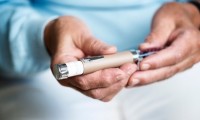-
VR Can Alleviate Brain Tumor Patients’ Anxiety During Treatment, Study Finds
- Source: drugdu
- 82
- July 25, 2023
-
New ultra-flexible neural implant records single-neuron activity in deep-brain regions
- Source: drugdu
- 106
- July 22, 2023
-
Black Patients with ICDs Have Higher Rate of Post-Implant Cardiac Events and Risk of Death
- Source: drugdu
- 127
- July 19, 2023
-
What the New CMS Payment Proposals Mean for Device Makers
- Source: drugdu
- 134
- July 17, 2023
-
FTC intervenes to correct Medtronic’s ‘erroneous assertions’ in antitrust case
- Source: drugdu
- 115
- July 8, 2023
-
Teleflex recall of separating vascular catheters labeled Class I event
- Source: drugdu
- 136
- June 30, 2023
-
More than 1.31 billion people could have diabetes by 2050, study says
- Source: drugdu
- 113
- June 28, 2023
-
Novo Nordisk says in talks to acquire French device-maker Biocorp for $165M
- Source: drugdu
- 130
- June 8, 2023
-
Restoring thought-controlled movement after spinal cord injury using a brain-computer interface
- Source: drugdu
- 127
- May 30, 2023
-
Abbott wins FDA spinal cord stimulation approval to challenge Nevro for back pain market
- Source: drugdu
- 134
- May 20, 2023
your submission has already been received.
OK
Subscribe
Please enter a valid Email address!
Submit
The most relevant industry news & insight will be sent to you every two weeks.













